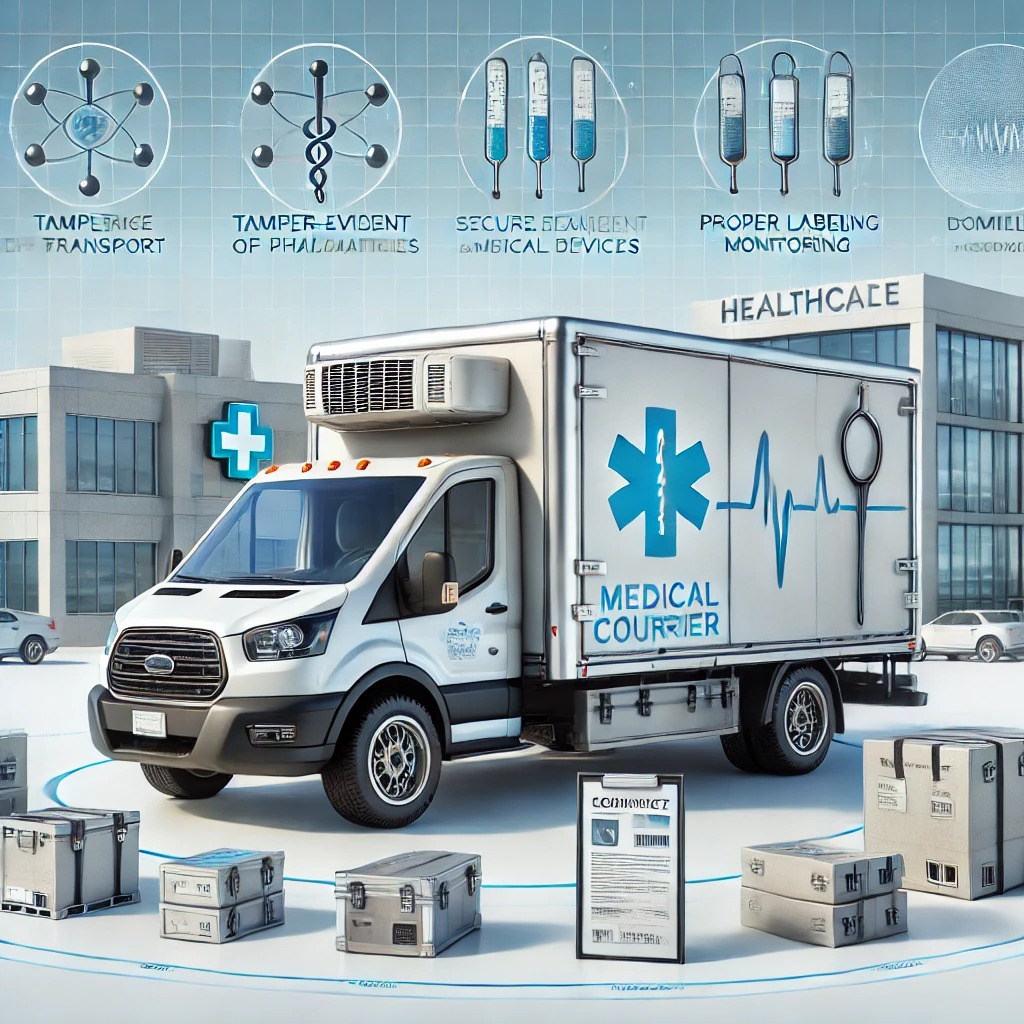Regulatory compliance is a cornerstone of medical courier operations, directly impacting the safety, security, and integrity of transported materials. With the high stakes involved in delivering specimens, pharmaceuticals, and medical devices, adherence to strict regulatory frameworks is essential for maintaining trust and operational efficiency in the healthcare industry.
Why Regulatory Compliance Matters in Medical Courier Services
- Patient Safety
Ensuring the safe and timely delivery of medical items such as lab specimens and medications is critical to patient outcomes. Compliance protocols reduce risks of contamination, mishandling, or delays. - Legal and Financial Repercussions
Failure to adhere to regulatory standards can lead to fines, legal actions, and reputational damage. Compliance safeguards courier companies and healthcare providers against these risks. - Quality Assurance
Strict adherence to regulations ensures that transported materials retain their intended quality, efficacy, and safety throughout the supply chain.
Key Regulations Governing Medical Courier Services
- HIPAA (Health Insurance Portability and Accountability Act)
HIPAA mandates the protection of sensitive patient information during transportation. Couriers handling items such as patient records or lab specimens must implement robust confidentiality and security measures. - OSHA (Occupational Safety and Health Administration)
OSHA guidelines dictate the safe handling of hazardous materials, such as bloodborne pathogens or biohazardous waste. Compliance includes proper packaging, labeling, and staff training. - FDA (Food and Drug Administration)
The FDA oversees the transport of pharmaceuticals and medical devices, ensuring that they meet stringent safety and efficacy standards throughout the logistics process. - DOT (Department of Transportation)
The DOT regulates the transport of hazardous materials, requiring couriers to comply with packaging, labeling, and documentation standards for medical items classified as hazardous. - CLIA (Clinical Laboratory Improvement Amendments)
CLIA impacts the transport of laboratory specimens, requiring couriers to maintain specimen integrity and ensure accurate diagnostics.
Essential Components of Regulatory Compliance
- Training and Certification
Personnel involved in medical courier operations must receive specialized training on handling sensitive materials, regulatory requirements, and emergency procedures. Certification programs ensure a standardized level of expertise. - Secure Packaging and Labeling
Compliance includes the use of tamper-evident and properly labeled packaging that adheres to regulatory guidelines. This prevents mishandling and ensures materials reach their destination safely. - Chain-of-Custody Protocols
Detailed documentation tracks every transfer of custody, providing a clear record of who handled the materials and when. This traceability is critical for audits and quality assurance. - Temperature Control Measures
For temperature-sensitive items, such as vaccines or biological specimens, compliance involves maintaining specific temperature ranges during transport. Advanced cold chain logistics systems ensure adherence to these requirements. - Documentation and Record-Keeping
Accurate and detailed records are a regulatory requirement. These include manifests, temperature logs, and incident reports, all of which must be readily accessible for audits.
Technological Advancements Supporting Compliance
- IoT and Real-Time Monitoring
IoT-enabled sensors track variables such as temperature, humidity, and location during transit. Real-time data transmission ensures immediate corrective actions in case of deviations. - Blockchain for Data Integrity
Blockchain technology provides a secure and immutable record of compliance-related data, reducing the risk of discrepancies or tampering. - Digital Compliance Management Systems
Automated platforms streamline the documentation and reporting of regulatory compliance, ensuring accuracy and reducing administrative burdens.
Challenges in Maintaining Regulatory Compliance
- Complex Regulatory Landscape
Medical courier services must navigate overlapping regulations across different jurisdictions, making compliance a multifaceted challenge. - Evolving Standards
Regulatory requirements are frequently updated to address new risks and advancements in technology. Keeping up with these changes requires continuous education and adaptation. - Cost of Implementation
Investing in compliance measures, such as training programs, technology, and secure packaging, can be resource-intensive, particularly for smaller courier companies.
Benefits of Regulatory Compliance for the Healthcare Industry
- Enhanced Trust and Credibility
Adherence to regulations builds trust among healthcare providers, patients, and regulators, positioning courier services as reliable partners in the healthcare ecosystem. - Improved Patient Outcomes
Compliance ensures that medical materials are delivered safely and intact, directly contributing to accurate diagnostics and effective treatments. - Operational Resilience
By proactively addressing compliance requirements, medical courier companies can reduce the likelihood of disruptions caused by audits, penalties, or incidents.
Key Insights
Regulatory compliance is a fundamental aspect of medical courier operations, safeguarding the integrity of healthcare logistics. By adhering to established standards, leveraging advanced technologies, and investing in comprehensive training, medical couriers uphold the quality and safety of their services. In a sector where precision and accountability are paramount, regulatory compliance serves as both a mandate and a measure of excellence.







